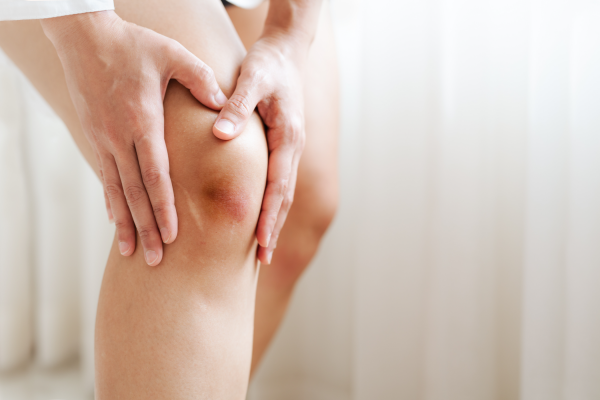
You may know it:you have been out for a day or you have worked hard and suddenly you find out in the evening that you have a bruise on your leg. You just assume that you unconsciously bumped into something. But there are many more reasons why you can suddenly bruise. We have listed 9 reasons for you!
As you get older, your skin also gets older and thinner. That also means your veins become more fragile. As a result, a small tap can quickly have an effect on your skin, causing it to discolour. So don't be surprised if you discover bruises more often after a light tap as you get older.
Read also :'How do you take good care of your skin?'
Are you baking in your garden with every ray of sunshine? Then it could well be that your skin has been slightly damaged by the sun. That then causes the walls of your blood cells to weaken, making you bruise more easily. Also, bruises often last longer and are darker if they are the result of sun-damaged skin. So always apply sunscreen well to prevent skin damage.
Do you notice that you bruise easily, even if you only lightly bump? Then you may be deficient in certain nutrients. Think of vitamin C, vitamin K or iron. As a result, your skin is not well able to make blood clots. So do you find a large and dark bruise on your body, but you are not sure where it can come from? Then visit your doctor to see if you are not suffering from a vitamin or iron deficiency.
Of course, not every vitamin pill gives you extra large bruises. But some supplements or medications can cause your skin to discolor more quickly. This may be because they sometimes contain blood thinners, which make your skin less able to produce blood clots. Medications and supplements that may have that effect on your body include aspirin, ibuprofen, vitamin E, and fish oil tablets. Do you really suffer from it regularly? Then discuss with your doctor what you could do about this.
Your liver makes proteins that help your blood to clot. Without these proteins, your skin can quickly discolor and even bleed earlier. Do you also have other complaints, such as nausea, abdominal pain, no appetite, dark urine and / or stools with a lighter color. That could just indicate a liver disorder. A common symptom is also a yellow glow on your skin and in your eyes. Do you suspect you have everyone among the members? Always visit your doctor before jumping to conclusions.
If your kidneys aren't working properly, they don't make enough platelets. This also makes you bruise faster. Kidney disease can be caused by high blood pressure or diabetes. Do you have more of the complaints, such as less urination, chronic fatigue, cramped muscles and/or itchy skin? Then, just to be sure, visit your doctor and investigate whether there is actually more going on.
The number of platelets in your body can also decrease due to an autoimmune disease. In fact, your immune system may attack your own blood cells and blood vessels, putting you at even greater risk of bruising. In addition to bruising, an autoimmune disease can also cause chronic fatigue, joint pain, fever and rash. Do you have one or more of these complaints? Then discuss this with your doctor to get a diagnosis.
There are many different blood disorders that can cause you to bruise easily. For example, if you don't produce enough platelets, your body can't stop any bleeding properly. Often people with blood disorders also experience a lot of nosebleeds, heavy menstrual complaints and bleeding gums. It is also best to discuss this with your doctor; not every bruise indicates a blood abnormality.
We have all ended up on a website about a terrible disease after googling our complaints. Fortunately, this cause is much less common than you might think. Do you find yourself getting bruises in weird places like your hands or your torso? And do you also experience complaints such as chronic fatigue, pale skin, headache, swollen and bleeding gums, unexpected weight loss, fever and excessive sweating? Then we recommend that you pay a visit to your doctor. Better safe than sorry!
